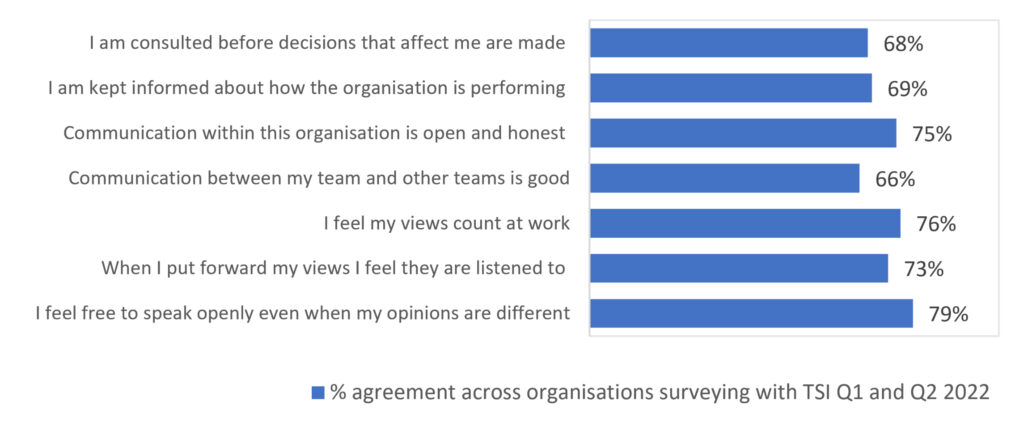Creating opportunities for people to have an effective voice at work
A culture where an organisation actively listens to and creates opportunities for people to have an effective voice is fundamental to ensuring job quality. When you’re not heard, you just do what you’re told without questioning or offering to speak up and change things because you don’t think anything will happen. This will often cause disengagement and poor company culture.
Consider how a culture of active listening skills in the workplace can increase productivity, facilitate a healthy workplace culture, prevent mistakes, and avoid misunderstandings and conflict. As individual’s develop this skill, they will interact better with colleagues, customers, clients, and key stakeholders.
If your organisation leads by example, you can use active listening techniques to make everyone feel heard and valued.

For example, one of my mentors has incredible body language when listening. In small-group settings, they look directly at the speaker, offer eye contact and a genuine smile that says, “I value you and everything you’re saying.” How many dramas and conflicts in your workplace would disappear if everyone showed this level of mutual respect?
Imagine if you take this one step further and the organisation gives all employees a voice. It stands to reason that if these techniques are applied to the organisation giving employees a voice, it can be harnessed to build a productive, engaged workplace where everyone feels listened to?
Encouraging a genuinely open culture via employee voice initiatives makes it so much more likely that your employees will speak up if they see something wrong. In some cases, this opportunity to fix issues internally can save a huge amount of financial and reputational damage.
If an organisation is willing to develop people based on their feedback – i.e. change work processes, improve company culture, listen to views and improve employees experience then they will be more willing to stay with the company long-term. This will become increasingly important as the great resignation continues.
Employees are likely to develop confidence and are more likely to ask for help or training. This will increase focus and happiness as they share problems which will, in turn, reduce negative attitudes and how they talk about the organisation, internally and externally.
Furthermore, being able to participate in decision-making automatically draws employees into the mission of the business. Rather than being there to follow orders, they become stakeholders that actively contribute to key business achievements.
Feedback from recent surveys shows that this is an area where organisations have room for improvement:

The CIPD define employee voice as:
“The means by which people communicate their views to their employer and influence matters that affect them at work”
Employee voice exists when:
- Communication tools have been put in place that enables employees to have ongoing conversations in different ways, to ensure every voice is heard.
- Everyone in the organisation feels they can have a say and that their voice is heard and listened to. Their views are taken into account when decisions are being discussed that affect them.
Your employee effective voice strategy should cover how you encourage your workforce to have their say, though a sustained program of initiatives. These might include both direct and indirect channels such as:
- Regular employee or ‘pulse’ surveys with a process for gathering and acting on feedback
- Starters and Leavers surveys or interviews
- Training on workplace practices and how to flag up when they aren’t being followed
- Regular one-to-ones with line managers for two-way feedback and suggestions, effective performance reviews
- Open office hours for senior managers and key decision makers
- Suggestion boxes and idea walls
- Open forums or meetings for discussing new initiatives and proposals
- Employee and or Trade Union representatives
- Transparent communication about company news and developments via weekly meetings, emails or company intranets
Key to your strategy is enabling a culture where there is trust and people feel it is safe to speak up, it is important to reflect different groups will have different needs here. For Gen Z, employee voice is an integral part of the employee value proposition. You need to consider how levels of trust are demonstrated in your organisation, what are the levels of autonomy, is there freedom around flexible working? Allowing employees to talk openly displays a level of trust which leads to employees feeling more valued and connected to leaders as well as other employees.
It is also important for leaders to show commitment to the strategy and demonstrate active listening. Leaders need to build employee voice mechanisms into the decision-making process and share decisions. The organisation needs to listen frequently and continually. They need to create an environment where everyone can share success, collaborate and share views safely. They need to be held to account and take action.
Middle managers are important here. They can make this a two-way process, opening a dialogue and taking action, closing the feedback loop. When higher management does not hear the employees’ views and ideas, it fuels employees’ resentment and lowers productivity. Proper feedback and actively considering the employees’ views and ideas are vital for a healthy workplace and performance, as well as giving employees an effective voice.
This is why the UK’s Engage for Success movement defines employee voice [https://engageforsuccess.org/employee-voice/] as one of their four main enablers of employee engagement and there is plenty of evidence on their website showing how engagement leads to higher productivity, improved innovation and a raft of other benefits.
Further information about an effective voice for your employees
If you would like to know more about how The Survey Initiative can help your organisation give your employees an effective voice at work, or any other questions about our employee survey services, employee engagement surveys or 360 feedback reports, call us on +44 (0)1255 850051.